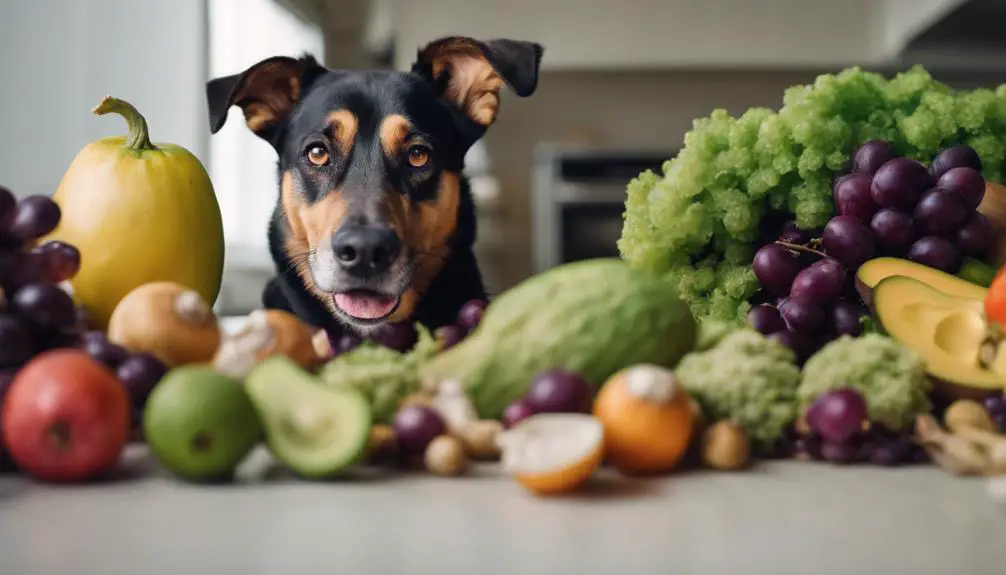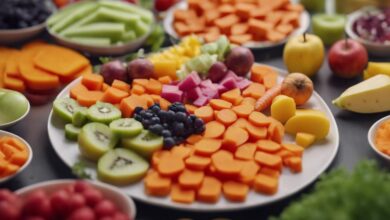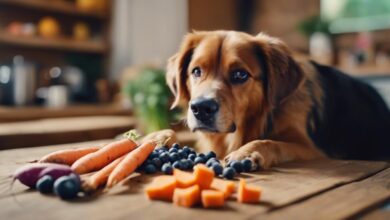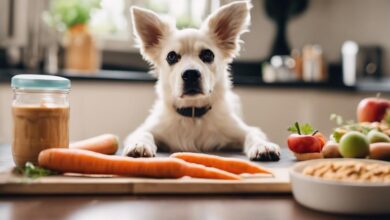What Fruits and Vegetables Can Dogs Not Eat
Avoid feeding your dogs grapes, raisins, onions, garlic, avocado, citrus fruits, and raw potatoes. They are harmful and can cause serious health issues like kidney failure, anemia, and digestive problems. Opt for safe alternatives like blueberries, apples, and strawberries instead. Remember that the compounds in onions and garlic can damage red blood cells, while avocado contains persin that leads to vomiting and pancreatitis. Citrus fruits and raw potatoes also pose risks due to toxicity and solanine respectively. Choosing the right fruits and vegetables for your furry friend is essential for their well-being.
Key Takeaways
- Grapes and raisins can lead to kidney failure and gastrointestinal issues.
- Onions and garlic may cause vomiting, diarrhea, and anemia.
- Avocados contain persin and high fat, leading to digestive problems.
- Citrus fruits have toxic components causing vomiting and discomfort.
- Raw potatoes contain solanine, cook them to make them safer for dogs.
Grapes and Raisins
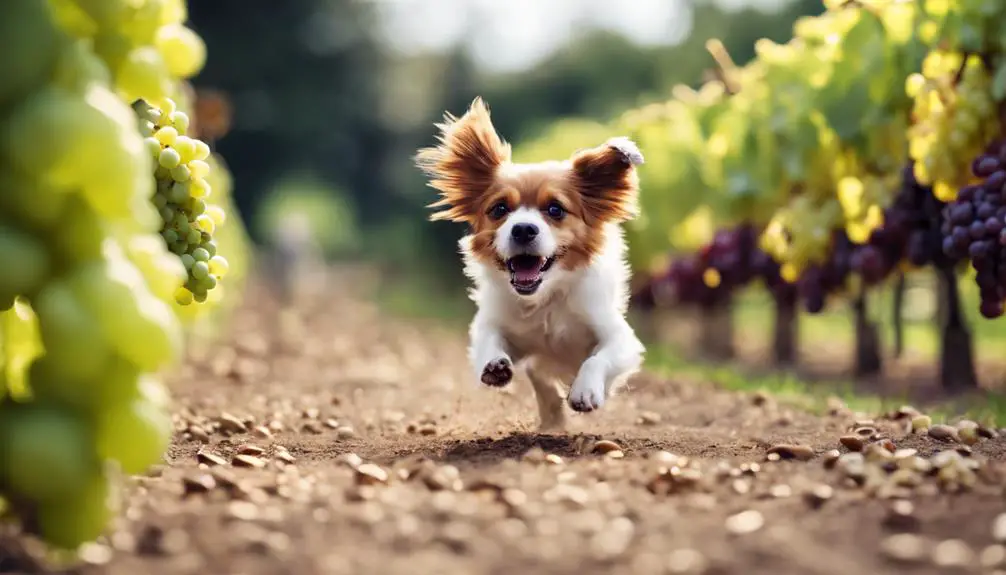
Grapes and raisins are highly toxic to dogs and can lead to severe health issues when ingested. The importance risks associated with these fruits can range from kidney failure to gastrointestinal problems in our canine companions. It is vital to understand that even small amounts of grapes or raisins can be harmful to dogs, so it is best to completely avoid feeding them to your furry friend. If you are looking for safe alternatives to these fruits, consider options like blueberries, apples, or strawberries, which are generally safe for dogs to consume in moderation. By being mindful of what you feed your dog, you can help prevent any potential health complications that may arise from ingesting toxic foods like grapes and raisins.
Onions and Garlic
You should be aware that onions and garlic are toxic to dogs. It is essential to avoid including them in your dog's meals as they can pose serious health risks. The consumption of onions and garlic can lead to symptoms such as vomiting, diarrhea, weakness, and even more severe conditions in dogs.
Toxic to Dogs
Onions and garlic are two common kitchen ingredients that can be toxic to dogs and should be avoided in their diet. These foods can lead to various health issues in dogs, including gastrointestinal problems, anemia, and even more severe conditions in some cases. The following points explain why onions and garlic are harmful to your furry friend:
- Toxic Compounds: Onions and garlic contain compounds that can damage your dog's red blood cells, leading to anemia.
- Gastrointestinal Distress: Consumption of onions and garlic can cause digestive issues such as vomiting, diarrhea, and abdominal pain.
- Allergic Reactions: Some dogs can develop food allergies to onions and garlic, resulting in skin irritation, itchiness, or other allergic symptoms.
Avoid in Meals
When including fruits and vegetables in your dog's meals, it is important to steer clear of onions and garlic due to their potential toxicity to your furry companion. Onions and garlic contain compounds that can be harmful to dogs, leading to a range of health issues. These ingredients can cause food allergies in some dogs, resulting in symptoms like itching, gastrointestinal upset, and skin problems. Additionally, onions and garlic can also lead to digestive issues such as stomach pain, vomiting, and diarrhea. It's essential to be mindful of what you feed your dog to safeguard their well-being and health. By avoiding onions and garlic in your dog's meals, you can prevent potential risks and keep your canine friend safe and healthy.
Health Risks Involved
To comprehend the potential health risks involved with onions and garlic for your dog, it is essential to recognize the toxic compounds these ingredients contain. These common kitchen staples can pose serious threats to your pet's well-being due to their ability to cause digestive issues, poisoning, and severe allergies. Here are the risks associated with feeding onions and garlic to your furry companion:
- Digestive Issues: Onions and garlic can irritate your dog's gastrointestinal tract, leading to symptoms like vomiting and diarrhea.
- Poisoning: These ingredients contain compounds that can cause oxidative damage to your dog's red blood cells, potentially resulting in anemia.
- Allergies and Safety: Dogs may have allergic reactions to onions and garlic, and in severe cases, ingestion can even be life-threatening. Be cautious and prioritize your dog's safety by avoiding these harmful foods.
Avocado
Consuming avocado is not recommended for dogs due to its potential toxicity to them. Avocado contains a substance called persin, which is harmful to dogs and can cause symptoms like vomiting and diarrhea. Additionally, the high-fat content in avocados can lead to pancreatitis in dogs. To keep your furry friend safe, it's best to avoid feeding them avocados altogether. Check out the table below for a quick reference on foods to avoid giving to your dog:
| Foods Not Safe for Dogs | Reason | Potential Symptoms |
|---|---|---|
| Avocado | Contains persin | Vomiting, diarrhea |
| Grapes/Raisins | Kidney damage | Kidney failure |
| Onions/Garlic | Toxic compounds | Anemia |
| Chocolate | Theobromine toxicity | Hyperactivity, tremors |
| Xylitol (sweetener) | Low blood sugar, liver failure | Vomiting, lethargy |
Citrus Fruits
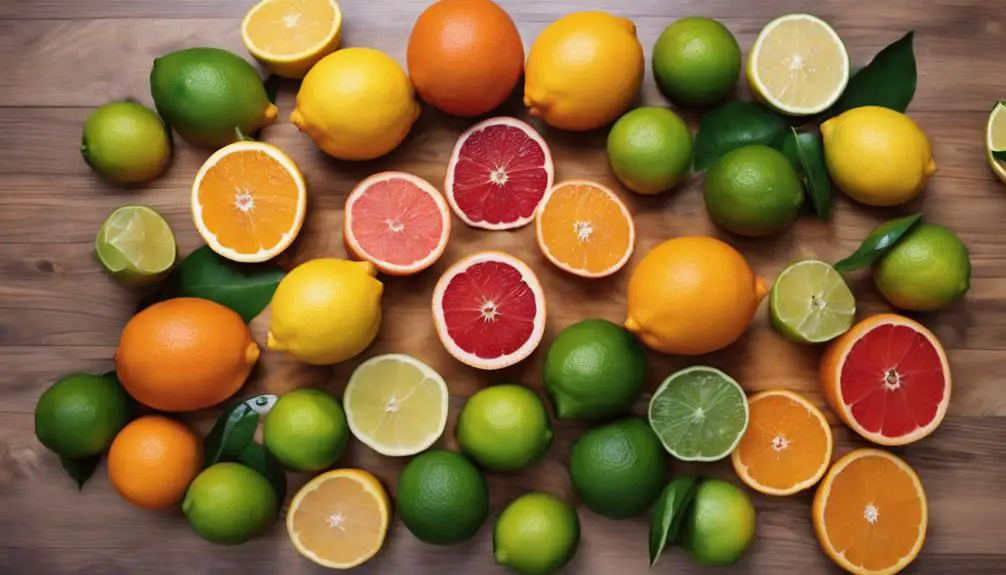
For dogs, it's important to be aware of the potential risks associated with citrus fruits in their diet. Citrus fruits can have harmful effects on your furry friend due to their acidic nature and essential oils, which can cause gastrointestinal upset and even be toxic in large quantities. Here are some reasons why you should avoid feeding your dog citrus fruits:
- Toxicity: Citrus fruits contain compounds that are toxic to dogs and can lead to symptoms like vomiting and diarrhea.
- Acidic Content: The high acidity in citrus fruits can cause irritation to the digestive system, leading to discomfort.
- Essential Oils: The essential oils present in citrus fruits can be harmful to dogs and may result in drooling, vomiting, or even tremors.
Raw Potatoes
Raw potatoes should not be included in your dog's diet due to potential health risks associated with their consumption. While cooked potatoes can be an important and ensure treat for your furry friend, raw potatoes contain solanine, a toxic compound that can be harmful to dogs. Cooking methods such as boiling, baking, or steaming can help break down solanine and make potatoes safer for your dog to eat. Additionally, portion control is vital when feeding your dog potatoes, as too much can lead to digestive issues like stomach pain, bloating, or even more severe conditions. To make sure your dog's safety, always feed them cooked potatoes in moderation and avoid raw potatoes altogether.
Stone Fruits
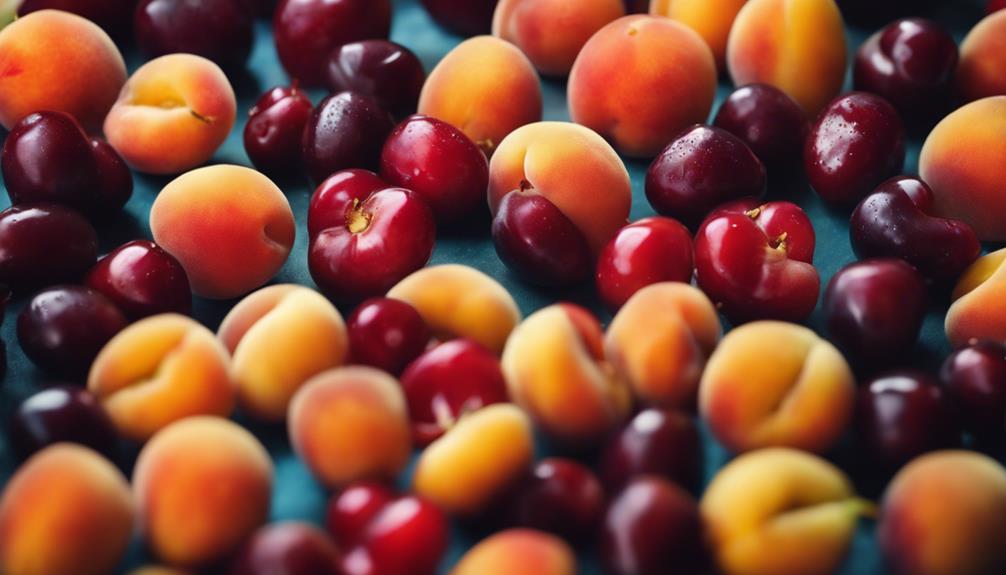
Stone fruits like cherries, peaches, plums, and apricots can pose potential health risks to your dog and should be approached with caution when considering them as part of their diet. These fruits can be harmful due to pit dangers, which may cause obstructions or choking hazards for your furry friend. Additionally, some dogs may experience allergic reactions to certain compounds found in stone fruits, leading to symptoms like itching, gastrointestinal upset, or even more severe responses. To guarantee the safety of incorporating stone fruits into your dog's diet, make sure to remove pits before offering these fruits to your dog and monitor them for any signs of discomfort or adverse reactions. When in doubt, consult your veterinarian to confirm the safety of including stone fruits in your dog's diet.

If Richie Bedard is a dog food expert, author, or any other figure in the field of dog nutrition that emerged after September 2021,
